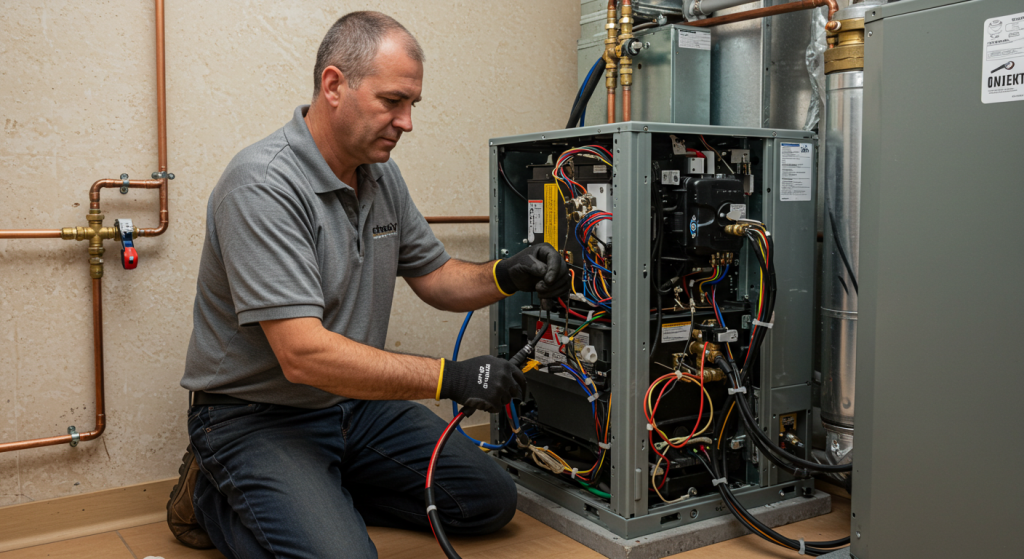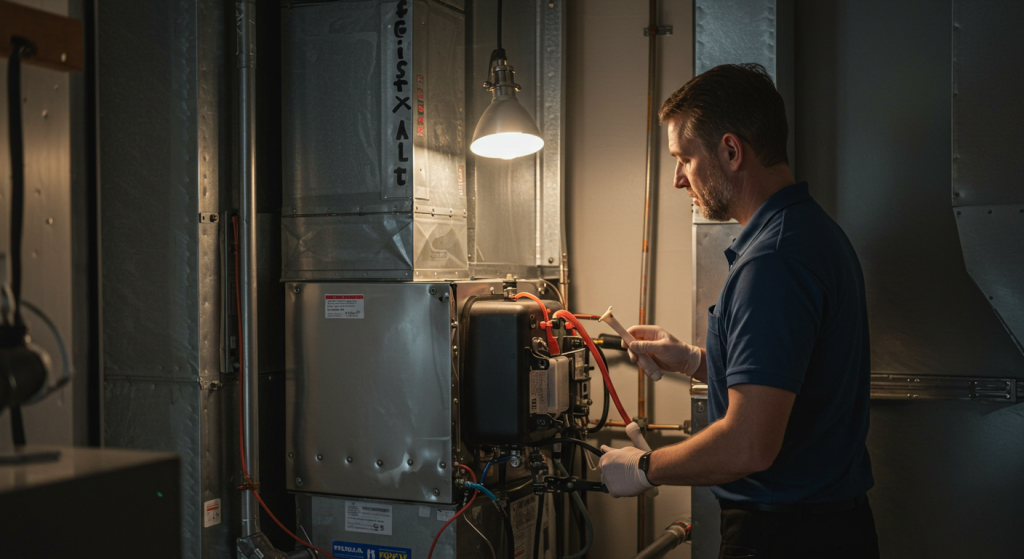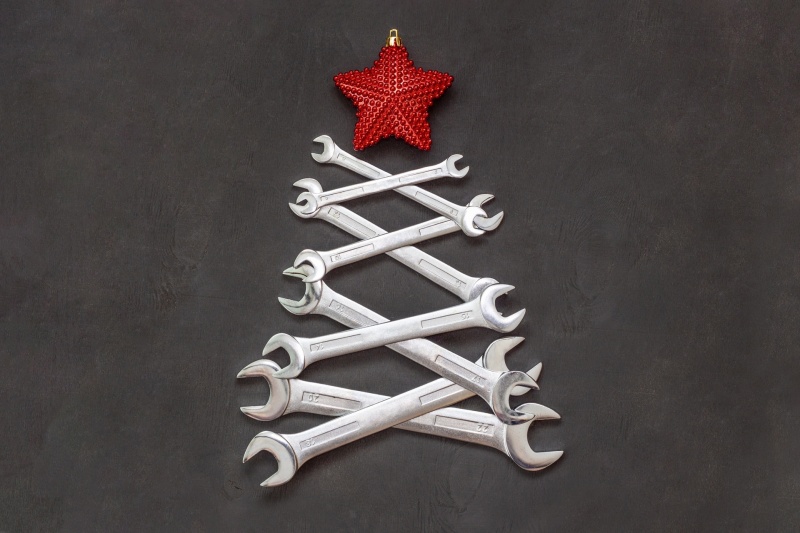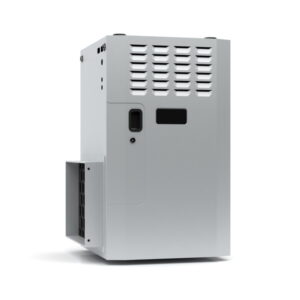Winter in Cumming, Georgia, can be a rollercoaster ride. One day, it’s chilly enough to bundle up. The next, you’re wondering if spring came early. While the unpredictable weather keeps things interesting, it also has a knack for sending energy bills soaring. If you’re feeling the pinch and suspect you might be overpaying for heating in Cumming, here are some practical, straightforward tips to help you keep your home cozy without breaking the bank.
Cheeky Heating, Cooling & Plumbing Blog: Archive for the ‘Heating’ Category
Are You Overpaying for Heat? How Cumming Homeowners Can Lower Winter Energy Bills
Monday, February 3rd, 2025Is Your First Floor Always Cold? 8 Easy Fixes That Work
Monday, January 20th, 2025Are you struggling to keep your first floor cozy during the colder months? Uneven heating is a common challenge in multi-story homes located in Cumming, GA. The good news is that there are practical solutions to ensure warmth throughout your home. Here are eight easy fixes to keep your downstairs as comfortable as the rest of the house.
Top Tips on How to Choose a Furnace Replacement That Qualifies for Energy Rebates
Saturday, January 11th, 2025At Cheeky Heating, Cooling & Plumbing, we know that selecting the right furnace is more than just a matter of keeping warm—it’s an investment in energy efficiency and long-term savings. Choosing a furnace replacement that qualifies for energy rebates can help you save money while boosting your home’s heating performance. Below, we break down what you need to know to make a smart and cost-effective choice.
Key Takeaways
- Homeowners can significantly reduce energy costs by utilizing federal tax credits and state rebate programs for energy-efficient furnaces, with potential savings of up to $2,000 for eligible installations.
- Furnaces must have a high Annual Fuel Utilization Efficiency (AFUE) rating and ENERGY STAR® certification to qualify for federal incentives, ensuring investment in the most efficient models available.
- Consulting certified HVAC professionals is crucial for proper installation, maximizing available rebates, and maintaining proper documentation for claims.

Understanding Energy Rebates
Energy rebates lower the initial cost of upgrading to energy-efficient systems by providing financial incentives. These programs are designed to promote energy savings by encouraging homeowners to choose high-efficiency heating solutions.
By taking advantage of rebates, you can reduce your monthly utility bills while maintaining a comfortable home during the winter. Rebates cover various energy upgrades, including high-efficiency heating systems, making it easier to enhance your home’s overall energy performance.
Federal Tax Credits for Energy-Efficient Furnaces
Federal tax credits can help lower your tax liability when you install a qualifying energy-efficient furnace. The Energy Efficiency Home Improvement Credit offers up to 30% back on high-efficiency HVAC installations. Combined with state and local rebates, this can lead to substantial savings.
Under the Inflation Reduction Act of 2022, homeowners can receive a maximum credit of $2,000 for eligible HVAC systems, including heat pumps, water heaters, and biomass stoves, and up to $1,200 for high-efficiency furnaces.
Only ENERGY STAR®-certified furnaces with an AFUE rating of 97% or higher qualify for these tax credits, ensuring that only top-performing systems receive incentives.
Annual Fuel Utilization Efficiency (AFUE) Ratings
AFUE ratings measure how efficiently a furnace converts fuel into heat. Furnaces with an AFUE rating of 90% or higher are considered high-efficiency models. For federal tax credit eligibility, gas furnaces must meet a minimum AFUE rating of 97%.
High-efficiency furnaces equipped with advanced features like condensing technology capture additional heat from exhaust gases, maximizing energy savings and ensuring eligibility for rebates.
ENERGY STAR® Certification
The ENERGY STAR® label is a critical factor in qualifying for federal tax credits and rebates. This certification ensures that the furnace meets stringent energy efficiency standards set by the U.S. Environmental Protection Agency.
Choosing an ENERGY STAR®-certified furnace guarantees superior efficiency, lower energy bills, and environmental benefits. This label is your assurance that the system you invest in meets the highest standards of performance.
State and Local Rebate Programs
In addition to federal tax credits, many states and municipalities offer rebate programs for energy-efficient home improvements. These programs vary by region, so it’s important to research your local options before making a purchase.
For example, states like New York and Massachusetts provide generous rebates for energy-efficient HVAC installations. Local utility companies often have their own rebate programs, further reducing the overall cost of upgrades. Be sure to contact your state energy office or utility provider for details on available incentives.
Utility Company Rebates
Utility companies frequently offer rebates for energy-efficient systems. These rebates typically come in the form of a check issued after installation and approval. Some utility companies also provide financing options for homeowners who want to upgrade their heating systems.
To find available rebates, use tools like the ENERGY STAR® rebate finder or contact your local utility company directly. Combining utility rebates with federal and state incentives can lead to significant savings.
Selecting an Energy-Efficient Furnace
When choosing a furnace, consider factors such as fuel type, size, and technological features. High-efficiency models with advanced technologies like variable-speed blowers and smart thermostat compatibility offer greater comfort and energy savings.
Furnaces that meet or exceed energy efficiency standards not only qualify for rebates but also help reduce long-term heating costs. Consulting with certified HVAC professionals can ensure you select a system that fits your home’s needs.
High-Efficiency Furnace Features
Modern high-efficiency furnaces are designed with features that enhance both performance and energy savings. Key features include:
- Variable-Speed Blowers: These adjust airflow based on heating demand, improving comfort and reducing energy use.
- Condensing Technology: This captures more heat from exhaust gases, increasing overall efficiency.
- Smart Thermostat Compatibility: These systems allow for precise control of temperature and can further reduce energy consumption.
Selecting a furnace with these features ensures eligibility for rebates and long-term energy savings.
Working with Certified HVAC Professionals
Proper installation is critical for maximizing furnace performance and qualifying for rebates. Certified HVAC professionals have the expertise to install high-efficiency systems correctly, ensuring you get the most out of your investment.
Programs like ENERGY STAR® Verified HVAC Installation offer additional assurance by providing contractors with guidelines and training to optimize system performance.
How to Apply for Energy Rebates
To apply for energy rebates:
- Contact Your State Energy Office: Verify the available programs and application requirements.
- Gather Required Documentation: This includes an itemized sales receipt or invoice and proof of energy efficiency certifications.
- Submit Your Application: Ensure you meet the deadline, typically within 90 days of purchase or by December 31, 2024.
Following these steps ensures you receive the maximum financial benefits from available rebate programs.
Maximizing Savings with Combined Incentives
Combining federal tax credits, state rebates, and utility company incentives can maximize your savings. The Inflation Reduction Act of 2022 has made it easier than ever for homeowners to invest in energy-efficient upgrades by offering substantial tax credits.
However, be aware that some state programs may limit how incentives can be combined. Reviewing these rules in advance ensures compliance and helps you plan your installation for maximum savings.
Summary
Choosing an energy-efficient furnace that qualifies for rebates and tax credits can lead to substantial financial savings and environmental benefits. By understanding federal, state, and local incentives, you can make an informed decision that keeps your home warm while minimizing costs.
At Cheeky Heating, Cooling & Plumbing, we’re here to help you navigate the process and find the best energy-efficient furnace for your home. Our team of certified professionals ensures proper installation, helping you claim all eligible rebates and enjoy long-term comfort and savings. Don’t go nuts—call Cheeky today!
Frequently Asked Questions
What documents are needed to apply for energy rebates?
To apply for energy rebates, you need an itemized sales receipt or invoice, proof of installation costs, and energy efficiency certifications.
How long do I have to submit my rebate application?
You must submit your rebate application within 90 days of the purchase or by December 31, 2024, whichever date comes first.
Can I combine federal tax credits with state rebates?
Yes, you can combine federal tax credits with state rebates to maximize your savings.
What is the maximum tax credit for HVAC systems?
The maximum tax credit for HVAC systems is $2,000 for heat pumps, water heaters, and biomass stoves, and $1,200 for furnaces.
Why is ENERGY STAR® certification important?
ENERGY STAR® certification guarantees that products meet rigorous energy efficiency standards, providing savings and supporting environmental sustainability.
Top Tips on How to Detect Furnace Problems Before Winter Arrives
Saturday, January 11th, 2025
At Cheeky Heating, Cooling & Plumbing, we understand the importance of a well-functioning furnace during the chilly months in Cumming, GA. To ensure your home stays warm and cozy, here are our top tips to detect furnace problems before winter arrives:
1. Listen for Unusual Sounds
Unusual noises like screeching, rattling, or banging can indicate mechanical issues within your furnace. For instance, a screeching sound might suggest a problem with the motor or blower belt, while rattling could mean loose parts. If you notice any of these sounds, it’s essential to contact a qualified HVAC technician immediately to prevent further damage.
2. Inspect the Furnace Air Filter
A dirty air filter can reduce heating performance and increase energy bills. We recommend checking and replacing your furnace air filter monthly, especially during seasonal transitions, to maintain optimal efficiency. Regularly replacing the air filter helps keep dust and debris out, ensuring the furnace runs smoothly.
3. Test Your Thermostat
Switch your thermostat from cooling to heating mode before the cold weather hits. Raise the temperature setting by five to ten degrees and listen for the furnace to kick on within a minute. If it doesn’t, there may be an issue with the thermostat or its wiring, and it’s advisable to call an HVAC technician to diagnose and fix the problem safely.
4. Examine the Heat Exchanger
The heat exchanger is crucial for transferring heat while preventing exhaust gases from entering your home. A cracked heat exchanger can pose serious health risks by allowing harmful gases like carbon monoxide to leak. It’s best to schedule a professional inspection to check for any cracks or leaks. Additionally, installing carbon monoxide detectors adds an extra layer of protection.
5. Look for Cold Spots in Your House
Uneven heating or cold spots can indicate issues with your HVAC system, such as blocked vents or improperly sized ducts. Identifying these spots early can help address underlying problems and improve heating efficiency. Sealing air leaks around doors and windows can also enhance comfort.
6. Monitor Energy Bills
A significant increase in your energy bills may suggest that your furnace is working harder than necessary due to an underlying issue. If you notice a spike, it’s wise to schedule a furnace inspection to identify and address the root cause.
7. Check for Burning Odors
When you first turn on your furnace, a brief smell of dust burning off is normal. However, persistent or strong burning smells could indicate an electrical issue or overheating components. If you detect such odors, turn off the furnace and call a professional immediately.
8. Test the Igniter Switch
The igniter switch is critical to your furnace’s operation. If the furnace doesn’t ignite, try pushing the reset button and checking the circuit breaker. Avoid repeatedly resetting it, as this can strain the system. If the problem persists, contact a professional, as igniter switches require careful handling.
9. Inspect the Blower and Motor
The blower and motor ensure warm air circulates throughout your home. If you hear unusual noises or detect strange smells from the blower, it may signal a problem requiring attention. Routine maintenance, such as lubrication and cleaning, helps maintain blower performance. For any unusual sounds or operational issues, call a technician to inspect and service the blower safely.
10. Verify Carbon Monoxide Detectors
Working carbon monoxide detectors are essential for safety during the heating season. Test detectors regularly and replace batteries as needed. If your detector indicates a carbon monoxide leak, evacuate your home immediately and contact emergency services. A professional inspection of your furnace’s heat exchanger can help prevent carbon monoxide leaks, ensuring your home stays safe.
Scheduling Pre-Winter Checkups
A pre-winter furnace inspection is critical for detecting issues early and preventing breakdowns. Schedule this inspection with a licensed technician during the fall to avoid the winter rush and ensure your furnace operates efficiently and safely.
Summary
In summary, conducting pre-winter furnace checks can save you from unexpected breakdowns and maintain a warm, comfortable home during the cold months. By listening for unusual sounds, inspecting the furnace air filter, testing your thermostat, examining the heat exchanger, looking for cold spots, monitoring energy bills, checking for burning odors, testing the igniter switch, inspecting the blower and motor, and verifying carbon monoxide detectors, you can detect and address potential problems early.
Remember, proactive furnace maintenance not only ensures your comfort but also enhances safety and efficiency. Take these steps seriously and schedule a professional inspection before winter arrives to enjoy a stress-free and cozy holiday season.
Why Cheeky Heating, Cooling & Plumbing?
At Cheeky, we pride ourselves on delivering high-quality HVAC services with a smile. As a family-owned business, we’re committed to doing it right—or it’s free! Our Total Care Club offers year-round maintenance to keep your systems running efficiently. Don’t go nuts when your furnace acts up—call Cheeky today!
Frequently Asked Questions
- Why is it important to listen for unusual sounds from my furnace?
Unusual sounds often signal mechanical issues that could lead to bigger problems. Addressing them early prevents costly repairs and keeps your home safe. - How often should I change my furnace air filter?
Check your filter monthly and replace it as needed to maintain efficiency and airflow. - What should I do if my thermostat doesn’t turn on the furnace?
Check for simple issues like dead batteries or tripped breakers. If unresolved, consult a professional. - How can I tell if my heat exchanger is damaged?
A professional inspection is the safest way to identify cracks or leaks in the heat exchanger. - Why are carbon monoxide detectors important for furnace safety?
They alert you to dangerous gas leaks, providing essential protection for you and your family.
Common Signs You Need a Furnace Repair
Monday, December 16th, 2024A properly functioning furnace is essential for keeping your home warm and comfortable during the colder months. But like any mechanical system, furnaces can develop issues over time. If you catch these issues early, you can avoid higher repair costs, prevent system breakdowns, maintain energy efficiency, and prolong the need for furnace replacement in Forsyth County, GA. In this blog, we’ll highlight the most common signs that your furnace may need repair. Knowing what to watch for can save you time, money, and a lot of frustration. Get a Free Thermostat Upgrade for your Ho Ho Holiday Joy! (Valid with completed heating repair).
When to Repair, Replace, or Tune Up a Heating System
Monday, October 7th, 2024A common question we get from homeowners is, “When does my heating system need a tune-up, a repair, or a replacement?” The first part of the question is easy: heating systems need maintenance every year. And unfortunately, a tune-up is not sufficient for a neglected heating system that needs repair. It’s knowing when to invest in a heating repair vs investing in a new system that gets tricky.
Homeowners can always count on us for a personal and professional opinion on this. However, there are some general guidelines that will clarify this dilemma for homeowners. Let’s dive into the topic of when to repair, when to tune up, and when to opt for a heating replacement in Cumming, GA.
No, You Should Never Try to Fix Your Furnace on Your Own—Here’s Why
Monday, February 19th, 2024When something goes wrong with your heating system, it often happens just when you need your heat the most. You want it fixed right away, and ideally, you would like that fix to be free. And hey, you’re a handy homeowner, inclined toward DIY projects. Maybe you can fix your furnace yourself!
We’ll stop you right there. Don’t do it. Here are some of the many reasons to trust a professional for furnace repair.
How Long You Can Expect Your Furnace to Last
Monday, February 5th, 2024You might have an aging furnace and be wondering how long it will be before you have to replace it. You might have purchased your home with the furnace already in it, and be curious about what to expect. Or you might be looking at new furnaces, seeing the variety of options, and asking yourself, How long will each of these last?
Regardless of your situation, having more information is always better. The more you know, the more you can prepare for the future. We’ve got the scoop for you: not just how long different types of furnaces last, but also what you can do to help them last as long as possible.
If Your Heater Won’t Make It Through Winter, What Should You Replace It With?
Monday, January 8th, 2024There are times in life when we’re faced with big questions. Sometimes, that question is: Can I have my heating system repaired or is it time to replace it? And then, once that question is resolved—either the heating system is beyond repair, or it would cost so much that it simply isn’t worth investing all that money in an old heater—you’re immediately faced with another question.
When you do need to replace your heater, what should you replace it with? Have heating system technologies changed since you last had to purchase one? What heating system options are currently available? Which ones are good choices for this climate, for your home, for your family’s needs, or for your budget?
Prepare Your Heater for Winter With Professional Maintenance
Monday, November 13th, 2023Ignoring it won’t make it go away: winter is coming. All you can do is get ready for when the cold weather hits. There are a variety of things on your to-do list, depending on your home and your family. But one thing everyone needs to do is make sure they’re ready to turn on the heat.
How will your heater do when you need to use it? Is it ready, clean, lubricated, and in tip-top condition? Only if you’ve gotten maintenance!










